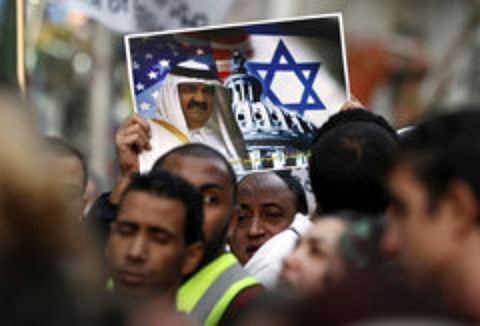Qatar aid breeds sceptism
Critics allege Doha’s short-term goal is to prop up the Muslim Brotherhood ahead of elections

Cairo: Qatar, a tiny country which has wielded oversize influence in revolutions across the Middle East, is now at the centre of a battle for clout in the region’s traditional military and political juggernaut, Egypt.
On May 9, Qatar released $3 billion (Dh11.01 billion) in low-interest loans to Egypt, the latest in a total of $8 billion in assistance it has provided in the past two years to Cairo’s Muslim Brotherhood-led government.
The move, which the government didn’t announce, was confirmed by a central bank official.
While many Egyptians are grateful for the cash, some worry that Qatar’s support of Egypt’s Islamist-leaning government marks Qatar’s latest attempt to gain influence in the region. Such suspicions have fuelled Qatar flag-burnings in Egypt in recent weeks — protests echoed by rallies in Libya, Tunisia and the Palestinian territories against Qatari meddling.
Many countries are seeking a stake in Egypt, said Abdul Moati Zaki Ebrahim, a founder of the Freedom and Justice Party, the Brotherhood’s political arm. “We are the gateway to the Middle East,” said Ebrahim, who is also an executive of the FJP’s political affairs committee.
Asked whether he was worried about Qatar trying to influence Egypt politically, Ebrahim said: “If the big powers aren’t working, why shouldn’t the little powers fill [the gap]? There’s an old saying: Someone asks a cat, ‘Why are you behaving like a lion? And the cat says, ‘because the lion is behaving like a cat’.” Qatar’s lifeline has allowed Cairo’s embattled government to hold off, for now, on agreeing to a $4.8 billion International Monetary Fund loan — one that would require it to slash social programmes just ahead of elections slated for later this year.
The Qatari aid underscores how Egypt, suffering from steep economic declines, is looking well beyond its traditional backers in Washington. In recent weeks, Egyptian President Mohammad Mursi has been seen “begging” for money in stately visits from Moscow to Doha, his opponents say, hurting the pride of a nation that has long seen itself as the region’s kingmaker.
Egypt is striving to have good relations with the world, counters Brotherhood spokesman Jihad Al Haddad, adding that Cairo’s previous dictatorial regime hurt the country by throwing its weight behind one power. “We no longer have a single ally called the United States. We have a menu of possible allies,” he said.
Critics allege that while Doha’s near-term goal appears to be to prop up the Brotherhood before elections, its longer-term aims are less clear.
“Egyptians aren’t stupid — they know this isn’t money given because Qatar is grateful for our historical contributions to the region, but because [Qatar] is mysterious and wants something,” said Hamdeen Sabahi, a secular opposition leader of the National Salvation Front who finished in third place in Egypt’s presidential elections last year.
“Egyptians feel that Qatar is not supporting them as a whole but [rather] the Muslim Brotherhood,” he said in a recent interview at his home.
The Qatari Embassy in Cairo and its foreign-affairs ministry in Doha didn’t respond to requests to comment. Criticism of Qatar’s role in Egypt boils down to opposition forces “that can’t attack their president, [so] they are attacking Qatar for helping,” said Nasser Bin Hamad Al Khalifa, Qatar’s former ambassador to the US.



